What in the hell are the Dallas Cowboys doing?
This has been a strange offseason in Big D. But those who've had a front-row seat in Jerry's World know it's no coincidence the NFCCG-less streak is at 28 years. ("It doesn’t ever really change.")
The uproar doesn’t make sense to those who’ve sat at the table. A team that’s won 12 games three seasons in a row, a team led by an 81-year-old owner who’s never shied away from a camera lens has been sitting on its hands all offseason.
Other contenders extend their core stars. Good teams typically choose to keep good players, and timing’s everything in today’s NFL. Being proactive frees up money in the present to sign pieces capable of getting you over the hump.
Yet here’s Dak Prescott entering the final year of his deal. And CeeDee Lamb entering the final year of his rookie contract. And Micah Parsons with two years left on his rookie deal. The Cowboys easily could’ve gotten ahead of the always-soaring quarterback market by locking up Prescott and structuring his deal in a way that made them an active player in free agency. Instead, their status quo is different. The personnel department under Will McClay does a bang-up job of identifying and drafting talent. That talent plays its way into richer contracts. Jerry Jones and Stephen Jones then bungle the next step.
Dallas doesn’t know who to pay, when to pay them and — despite the rhetoric — does not function as an all-in contender.
Twenty-eight years have passed since the Cowboys have even appeared in a conference championship game. Maybe everyone else is confused. Not those who’ve seen how the Cowboys function firsthand.
This is a perfect time to check back in with those on staff who helped explain Jerry’s World in our 2021 three-part series. Problems outlined then have only lingered, and it’s a shame. Prime opportunities at the Super Bowl fade away.
“It is crazy what’s going on,” one former Cowboys personnel says, “and it doesn’t ever really change.”
A failure to grasp the quarterback market. A resistance to spend money on veterans who can swiftly close that title gap. A failure to re-sign their own at the right time. And, sadly, even tales of Jerry Jones’ raunchy sexual escapades.
It all continues, year to year, and the Dallas Cowboys only burgeon their own reputation as the NFL’s preeminent underachievers.
Day 1 of free agency passed. Then, Day 2. Then, Day 3.
Then, a month.
Nothing.
A team that made one of the first epic splashes in NFL free agency by signing Deion Sanders has become a team scared of getting locked into splashy deals. In March, the dictate from ownership is often to “bottom-feed,” to let other teams spend the big bucks through the first wave of free agency and then try to find bargains. That sounds like sound fiscal responsibility. True, many contracts those first 48 hours backfire on clubs.
But there’s a fine line between maintaining a budget and missing an opportunity at a Super Bowl.
Most of the last decade, the Cowboys have poured cold water on their own title hopes.
Technically, sure, you’re overpaying for a veteran in the first wave. But if the primary objective for a team is to win a championship, the overpay is justified. An objective that’s always been blurry in Big D and has frustrated people in the building for years. Central to the decision-making is a “push and pull,” this personnel man says, between the team’s two most powerful men.
Jerry Jones — the father, the patriarch atop the organization — wants to spend money.
Stephen Jones — the son, the heir apparent who has gained power over time — does not.
Go Long is your home for longform journalism.
We are completely independent. Unbound by corporate masters or sponsors, we’d love your support.
This dichotomy dates all the way back to that Sanders deal in ‘95. Stephen “went absolutely ballistic” on his Dad, he says, because Son believed this was a terrible contract. Of course, the only way any team gets a talent like Deion back then or, for that matter, a B+ talent today is to spend more. That’s how the free market works in the NFL.
“Jerry is more willing to open up the checkbook and pay,” says this longtime personnel man. “Stephen’s always the one that’s trying to hone him in and prevent him from bankrupting the salary cap. And sometimes, it’s the right thing to do and sometimes it isn’t. There were a couple offseasons where we could have improved ourselves in free agency by being active and we chose not to when we tried to do it through the draft.”
Building through the draft is wise.
Relying on third- and fourth-rounders to start immediately is not.
Inside AT&T Stadium, the Cowboys were spanked 48-32 by Jordan Love and the Green Bay Packers. But unless the goal is a teardown, it behooved the Cowboys to lift themselves off the canvas and chart a realistic path back to this moment. This offseason was a true opportunity to push the chips in. Instead, Dallas opted for more “bottom-feeders.” Instead, they went thrifting for players who won’t change the NFC calculus one iota: Eric Kendricks, Royce Freeman and — laughably — Ezekiel Elliott, the running back they once grossly overpaid. The team’s headline addition was defensive coordinator Mike Zimmer. The same Zimmer who failed to connect with players in spectacular fashion his final years as the Minnesota Vikings head coach.
These are not the moves that elevate a contender.
Elsewhere, teams aggressively evolved.
The Cowboys have been here before, too. The 2007 team was stunned by Eli Manning at home in the divisional round. The 2014 edition lost at Lambeau Field in the same round on a controversial fourth-down call. A decade later, fans still claim “Dez caught it.” The 2016 team — a No. 1 seed, a 13-3 team — was then victimized by one of Aaron Rodgers’ best throws of all-time. Repeatedly, the Cowboys fail to go all-in on such rosters. One former colleague believes Stephen Jones is very, very “frugal” compared to others around the NFL, and that he values what the analytic department and capologists on staff tell him more than those stressing the reward in such financial risk.
“You are overpaying for those guys,” this former front-office member explains. “But sometimes you have to do it to get the piece that’s going to put you over the top. It’s hard to do it in the draft. You can keep replenishing young talent and if you do it the right way, that helps you a lot: drafting the right way. But the first two rounds are 50/50. If you get one player out of your first two picks, then you’re doing pretty good, but there’s just not enough draft picks to really make an impact unless you really hit on a guy.”
The sweet spot is somewhere between the impulses of father and son.
This isn’t a total funhouse-mirror clown show. There are sharp minds on staff. Once a season ends, the Cowboys evaluate their own roster and identify the most glaring holes. Scouts on the pro side then pinpoint a free agent, or two, or three, who’d supply a significant jump in production.
Playoff teams aggressively fill those needs, so they’re not drafting for need the next month.
The last decade is chockfull of bold swings that paid off. The Kansas City Chiefs are always reinventing, always attacking their needs with intensity. When Mahomes ran for 497 yards before pass attempts and sacks in a 31-9 bloodbath of a Super Bowl loss to Tampa Bay, the Chiefs paid up for linemen. Sean McVay and Les Snead went on the NFL equivalent of a Four Loko binge to get over the hump. (The original Loko recipe, that is.) Those Los Angeles Rams made a mockery of the same analytics Stephen Jones apparently cherishes. The result: a title. Even the perennially frugal Cincinnati Bengals reeled in the same left tackle KC did two years prior: Orlando Brown Jr., “Son of Zeus.”
San Francisco explores every avenue, trading for the best left tackle (Trent Williams) and best running back (Christian McCaffrey) in the sport.
All the Buccaneers did was acquire Tom Brady, and everyone else possible his three years.
Even through a stretch of solid drafts that keep the roster competitive, the Cowboys have often missed out on the best player available. Inaction in March forces them to reach for need in April.
“Sometimes we were reaching down in the draft to get an offensive lineman or a certain position,” says a former personnel man. “We’re in the first round reaching into the second round to fill that need when we could be getting a top 15 pick. This is my opinion: I think it’s more Stephen than Jerry. If you can convince Jerry that this guy you’re going to sign is going to be a difference-maker and help you get it over the top, he’ll get the deal done. He’ll figure out a way to get the deal done. But Stephen’s always sort of pulling that back.”
Of course, the Cowboys would be in a better financial state to go big-game hunting like the Chiefs, Rams, 49ers, etc. if they knew when to sign their own.
We could all engage in an endless, logical debate over where Dak Prescott fits into the pantheon of today’s best quarterbacks. Last season was the perfect encapsulation of his career. Prescott torched defenses for the most touchdowns in the NFL (36), third-most passing yards (4,516) and the best completion percentage for passers with at least 250 attempts (69.6). But he also fell to 2-5 in the postseason, and all QBs are ultimately judged in January.
This being said, if the Cowboys released Prescott today, what’s the master plan?
Trey Lance?
A trip to Backup Quarterback Island?
A carefully crafted tank for a 2026 draft prospect with a 50 percent chance at succeeding?
“These guys just aren’t laying around,” says one former Cowboys front-office member. “All these other positions, there are a bunch of guys out there. You can go get someone else who can fill that spot. Maybe not as well, but at least a rough estimation of how the guy is. But there’s not that many starting quarterbacks of Dak Prescott’s caliber out there. There just isn’t.”
Prescott counts $55.45 million against the cap this 2024 season.
Theoretically, the Cowboys could’ve extended Prescott two months ago, withered this number down and signed a player who helps them step into the ring with anybody in a wide-open NFC.
Now? This exec agrees that Prescott has his employer by the proverbial genitals… and it was all spectacularly predictable. Other quarterbacks were bound to sign contracts. The Detroit Lions inked Jared Goff to a four-year, $212 million deal. Jacksonville (Trevor Lawrence) and Miami (Tua Tagovailoa) may not be far behind. Prescott’s camp can easily make the case that he deserves more money than all the above, so Prescott can bet on himself if he pleases. Perform anywhere near his ’23 level and his market price soars.
Pre-Goff, the Cowboys likely could’ve re-signed Prescott at less than Goff’s numbers.
Now, that’s the floor for any negotiation.
The 2016 fourth-round pick has been the face of the team on and off the field. He’s only 30 years old. His reps don’t need to piece together a Frankensteinian sale’s pitch — the QB has undeniably progressed. Dallas is likely in shambles without him.
ESPN reports that the Cowboys are “all in” on re-signing Prescott, but a golden opportunity pre-free agency passed the team by.
In an alternate universe, the Cowboys extend Prescott, lower that $55.45M figure in ‘24 and, as this former exec explains, have a heart-to-heart conversation with the QB. Tell Prescott that any ‘24 money lost would be used to acquire an elite talent “because you don’t want to finish your career as another Dallas Cowboy quarterback who was good but couldn’t win a Super Bowl.”
Without those pieces, this team’s maxed out.
New contenders such as Green Bay and Detroit have emerged.
The risk in pushing guarantees down the line with any player is a mountain of dead money. Pressure to win now compels most contenders to kick expenses down the road because, hell, if it doesn’t work out? Those financial ruins become someone else’s problem. Again, it’s different in Dallas. The owner isn’t firing the GM because they’re one and the same. Perhaps the fact that Jerry and Stephen aren’t going anywhere is why Jerry and Stephen are fearful of fat on the payroll.
Either way, it’s ironic that the richest sports franchise in the world is worried about money.
“They hate dead money,” one former Cowboys exec says, “and paying people not to work.”
Compare this to their chief rival in the NFC East. The Philadelphia Eagles, under Jeff Lurie, do not give a damn about dead money. They’ve gotten deals done with their stars well in advance. Remember, GM Howie Roseman inked Jalen Hurts to an extension ahead of the manic QB flurry of deals, and still found a way to extend both Devonta Smith and A.J. Brown.
Meanwhile, the Cowboys are A-OK letting coaches enter the final year of their contract, the case for Mike McCarthy in 2024.
Maybe the Cowboys save a buck. This lame-duck approach needlessly injects more pressure into the building. More stress. The Cowboys are already the most-debated team in the country. People who’ve worked for Jones do have very nice things to say about the man as a boss. But whether the head honcho knows it or not, they cite this age-old business practice as terrible for morale. Forcing coaches to operate on one-year deals, commonplace in Dallas, is the sort of finite thinking that dooms CEOs in all fields, as detailed by the exceptional Simon Sinek in “The Infinite Game.” The Jones family isn’t seeing the big picture.
McCarthy could’ve been fired after losing to the Packers in the playoffs, and few would’ve batted an eye. His career is full of jarring playoff defeats.
Perhaps there is a head coach out there capable of delivering a championship.
However, everyone knows Jones prefers coaches he can control. That whittles the pool of potential hires.
The Cowboys are now trying to thread a needle with McCarthy: We love ya, Mike. But not really. Win now or else.
“At least give him a one-year extension,” says a former Cowboys personnel man. “You may not have to give him another five years, but at least extend them out one year and extend out all the coaches one year to give them a level of security. But what they don’t want is to extend out Dak and then have to move on from him, and then there’s going to be a bunch of dead money there that they’re paying that he is not playing for you anymore.”
The sort of bookkeeping you’d expect elsewhere. Not in Dallas. Not “America’s Team.”
In that nickname, maybe we get our answer. Judged by their actions, the Cowboys’ primary goal isn’t necessarily to win the Super Bowl. It’s polishing the brand. And this remains baffling to those who pass through the building. Jerry Jones may not have many more realistic opportunities to hoist the Lombardi Trophy. Ego is to blame. Sources repeatedly say Jones is determined to prove he can win a Super Bowl with himself central to the operation.
Head coaches across the NFL harp nonstop on developing a true “culture.” One rooted in “accountability.”
Ownership in Dallas hijacks culture. One former personnel man says the relationship between players and ownership “supersedes the coach’s ability to actually influence the players and influence the locker room.” This was not the case when Jimmy Johnson (1989- ’93) and Bill Parcells (2003- ’06) served as head coach. Johnson, especially, had total command of the locker room. He knew which buttons to push. (Jeff Pearlman’s “Boys will be Boys,” is another must-read.)
Multiple people high up in the organization indicate that current players are more concerned about Jerry Jones than their own head coach. They know ownership can undermine the head coach at any moment.
“So that means you can get a talented team like they’ve had,” this personnel source says, “but they’re going to underachieve when the coaches can’t influence the players the way they need to.”
Jason Garrett navigated this world best he could.
McCarthy is doing the same, but he may be growing frustrated.
“He’s doing it the best he can,” the former Cowboys personnel man says. “Some of the people I’ve talked to have said that he’s getting fed up with it a little bit.
“It’s hard. I feel bad for Dak. I think Dak’s a really good quarterback who is capable of taking a team to the Super Bowl. He’s got to overcome a lot of things.”
Credit where credit is due: McCarthy has proven that the X’s and O’s have not passed him by. At the tail end of his Packers run, that was a very real concern. His offense became stagnant and stale and Rodgers might’ve had good reason to railroad his coach’s scheme down-in and down-out. McCarthy’s Cowboys scored 29.9 points per game last season, the most in the NFL. Coach and QB unequivocally have a good thing going, and that’s rare.
He also wasn’t born yesterday. McCarthy must’ve known there would be challenges working under Jones.
There’s a difference between hearing what life’s like in Dallas, and living it.
Parcells tried changing the status quo and even led a Quincy Carter-quarterbacked team to the playoffs. He didn’t last long.
The Cowboys won’t bellyflop into obscurity with McClay as the de facto general manager. The Jones family likely pays him handsomely to sick around and one former co-worker doesn’t expect McClay to ever leave. Stephen Jones trusts him. McClay knows that trust will help him over the next five, 10, 15 years. There’s no telling what situation you’re walking into elsewhere. Jerry and Stephen have final say — but McClay has a lot of influence.
That being said, to survive, it’s best to finesse your concerns with Jerry and Stephen.
Nobody can punch a wall and demand change.
“You kind of — in a nice way — present the other side and then try to push for what you want and try to influence it that way,” one former Cowboys exec says. “That’s the only way you can do it. You’re not going to be able to do what Parcells did. He told them, ‘You’re out of all this decision making. I’m making all the decisions.’ Jerry was desperate to turn the program around so they could get enough money to build the new stadium so he was willing to take a backseat to Parcells. Parcells fixed it. But then after a few years, he couldn’t help himself and he started butting in too much. And I think that’s one of the reasons why Parcells moved on because he didn’t want to have to deal with all of those headaches.”
If father and son were to take truth serum, would they admit it’s best to let football people make the football decisions and to stay out of the way?
Or do they believe the Cowboys truly are best off if they call the shots?
This source believes they’ve kidded themselves into thinking they’re listening to the right people. Like all NFL teams, the Cowboys have meetings. They allow coaches and personnel to express their opinions. Many times, they do make the best decision. Many times, correct advice is ignored.
Jerry Jones once told people close to him that when he ceded that control to Parcells, yes, the Cowboys were winning again. But he was never more “miserable.” He didn’t enjoy seeing someone else as the boss — even if it was a future Hall of Famer — and vowed to never make that mistake again.
“It would feel hollow to him if they won with him just taking a complete backseat,” the former exec says.
Meanwhile, other franchises hire GMs and coaches and coordinators and let them do their jobs.
“You hired him for a reason,” the exec continues. “You believed in what their philosophy was. Let him execute the philosophy. If it doesn’t work? Then, you move on from him. But when you’re meddling and you’re not only telling the personnel people who to draft and who to sign, but you’re also influencing what plays are called and things like that, it’s just going to hurt what's going on.”
Things aren’t normal here. Right down to the long breaks between draft picks. During one draft in recent years, the Cowboys didn’t have a selection for 2 to 3 hours. Father and son held an impromptu story-time session, and it got weird. Really weird. One source recalls Jones telling “one of the most crude, vulgar stories about hooking up with women.” He couldn’t believe Jones was talking like this in front of his own daughter. Then, it hit him. Charlotte Jones is likely immune to such vile stories from Dad.
“She’s probably heard similar stories dozens of times,” he says.
A perfect microcosm of the Cowboys as an organization. It’s been nearly three decades since this team advanced to the NFC Championship. The only other team that’s failed to reach the NFC title game since 1995 is Washington. With Dan Snyder out, there’s finally hope in D.C. The Jones family isn’t going anywhere and those who stick around long enough become immune to how all business is conducted.
The bizarre is expected.
There’s talent on this roster. Prescott could rise up in a wide-open NFC. He’s in his prime. He’s talented enough to fight through this muck.
Of course, nobody will be surprised if the Cowboys reach double-digit wins and are one-and-done. Again.
“Inside Jerry’s World” series from 2021, icymi:
Go Long recently placed first in the APSE’s 2023 Long Features category.
Here is that story:
'I’m still alive:' The Zay Jones story
JACKSONVILLE, Fla. — Zay Jones shouldn’t be lounging here at Jaguars HQ. He knows that much. He knows he tried to hurl himself through the window of a Los Angeles condo 30 floors high. The events of March 19, 2018 horrified the sports world. We all remember the 1-minute, 49-second TMZ footage. First, Zay storms naked through…
Miss our two-part series on the Chicago Bears and Caleb Williams?
Part I:
You're up Caleb Williams, Part I: All falls apart
The most ballyhooed draft pick in the history of the Chicago Bears is wasting no time ushering in his own signature celebration. Whenever cameras are near, Caleb Williams curls his five fingers inward for a “bear claw.” Sometimes, he adds a scowling snarl for effect. Other times, his expression is emotionless. But he’s bringing the claw everywhere — the private jet with wide receiver Rome Odunze, a Chicago Cubs game, a Chicago Sky game, Halas Hall — and it’s either insane nobody in the Bears’ 105-year existence has made this a trend before or it’s Gen Z cringe fit for the 14-year-olds on TikTok. Either way, the claw is here to stay and everyone should get used to a quarterback who’s unlike any No. 1 pick before him.
Part II:
You're up Caleb Williams, Part II: 'Mini Mahomes'
Miss Part I? Read here. He paints his fingernails. For football games. And when he’s not inscribing “F” and “U” and those two other letters directed at USC’s opponent that week, this quarterback busts out nail polish as hot pink as both his cell phone and lip gloss — yes, lip gloss — while taking in a March Madness game.
Our 1 on 1 with Buffalo Bills GM Brandon Beane:
The Buffalo Bills' psychological reset
Blood still oozes from the latest scar. For all involved. How could it not? Through this window at One Bills Drive, directly behind the team’s general manager, the Buffalo Bills finally got the Kansas City Chiefs in their house, in January, and… lost.



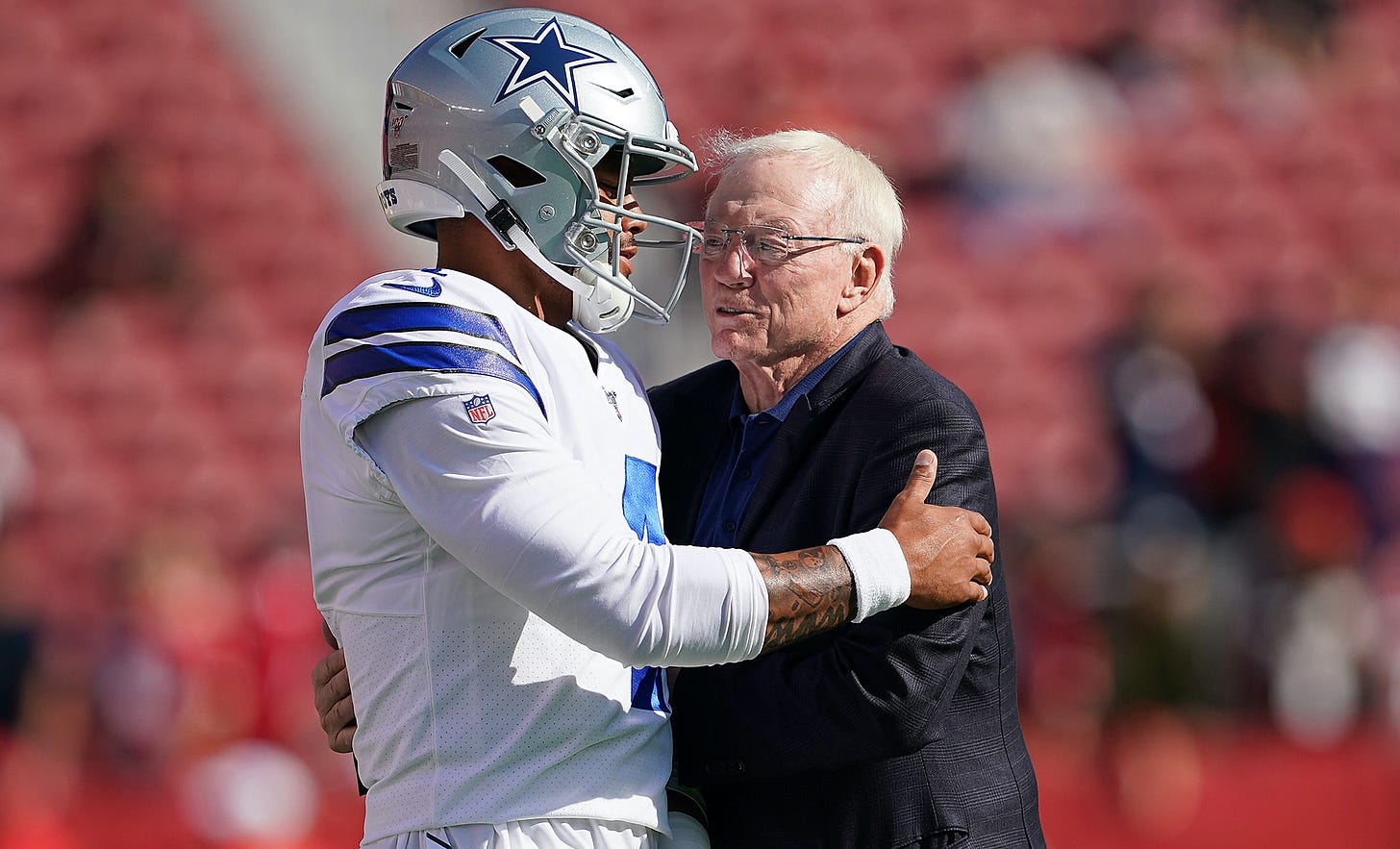
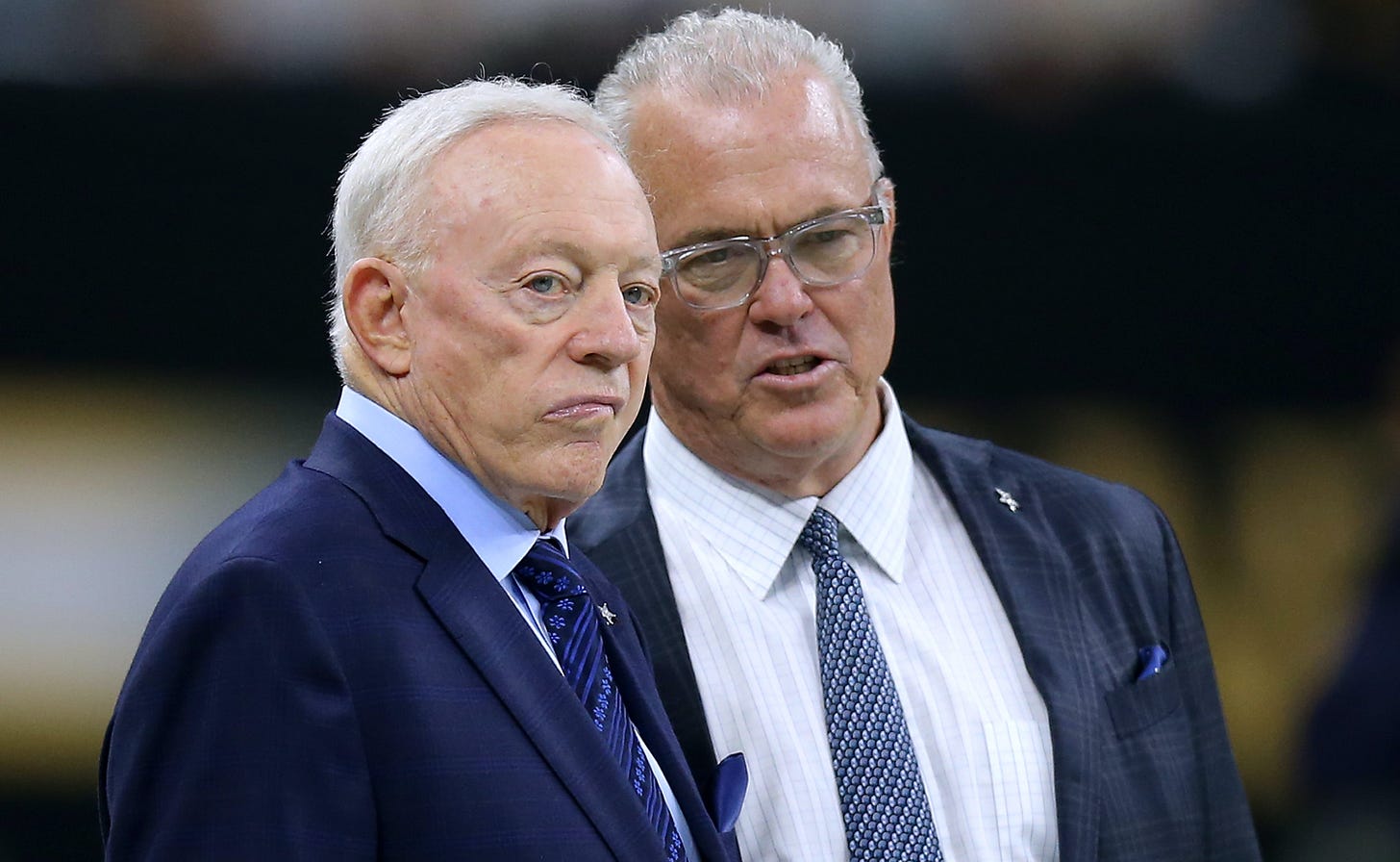
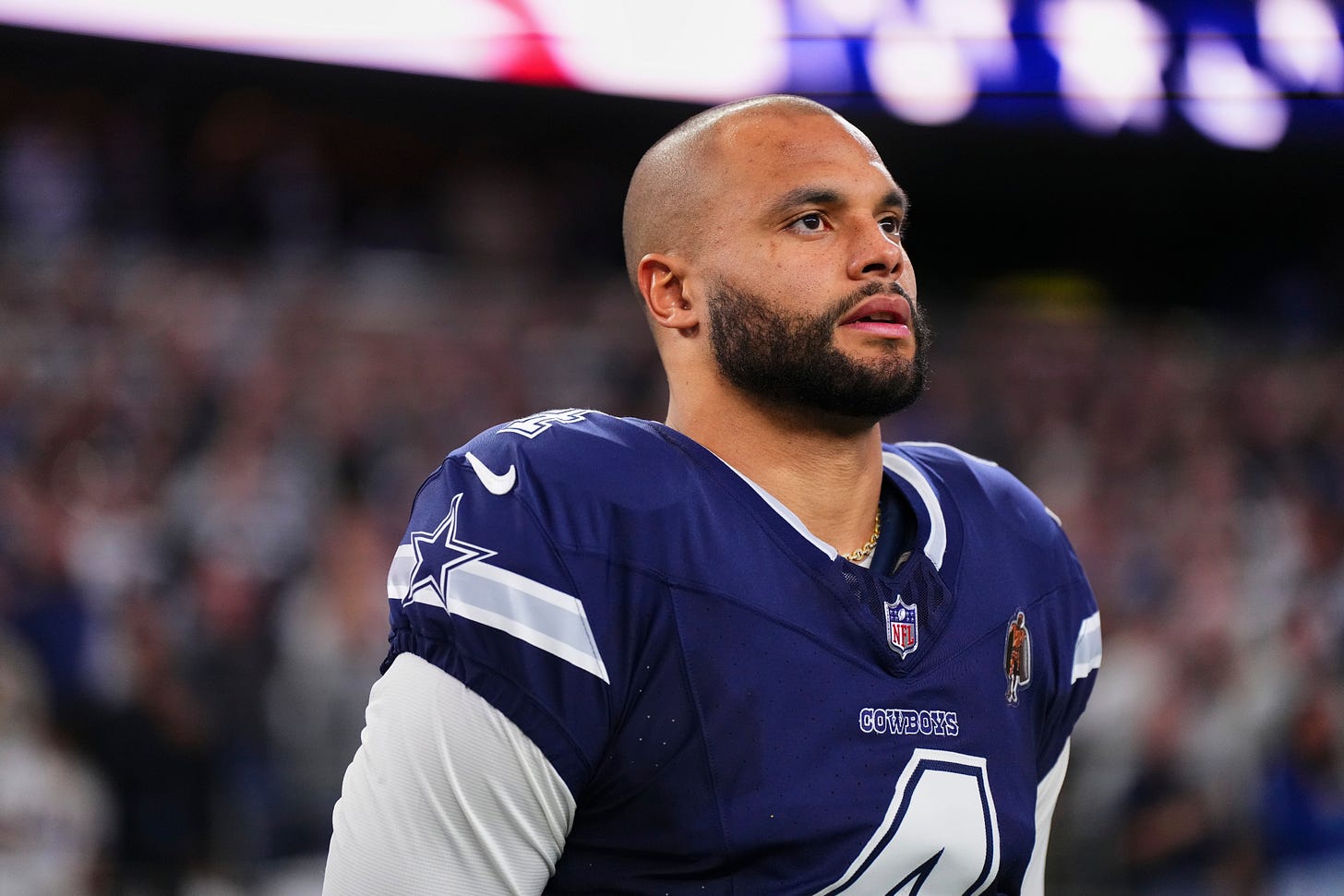
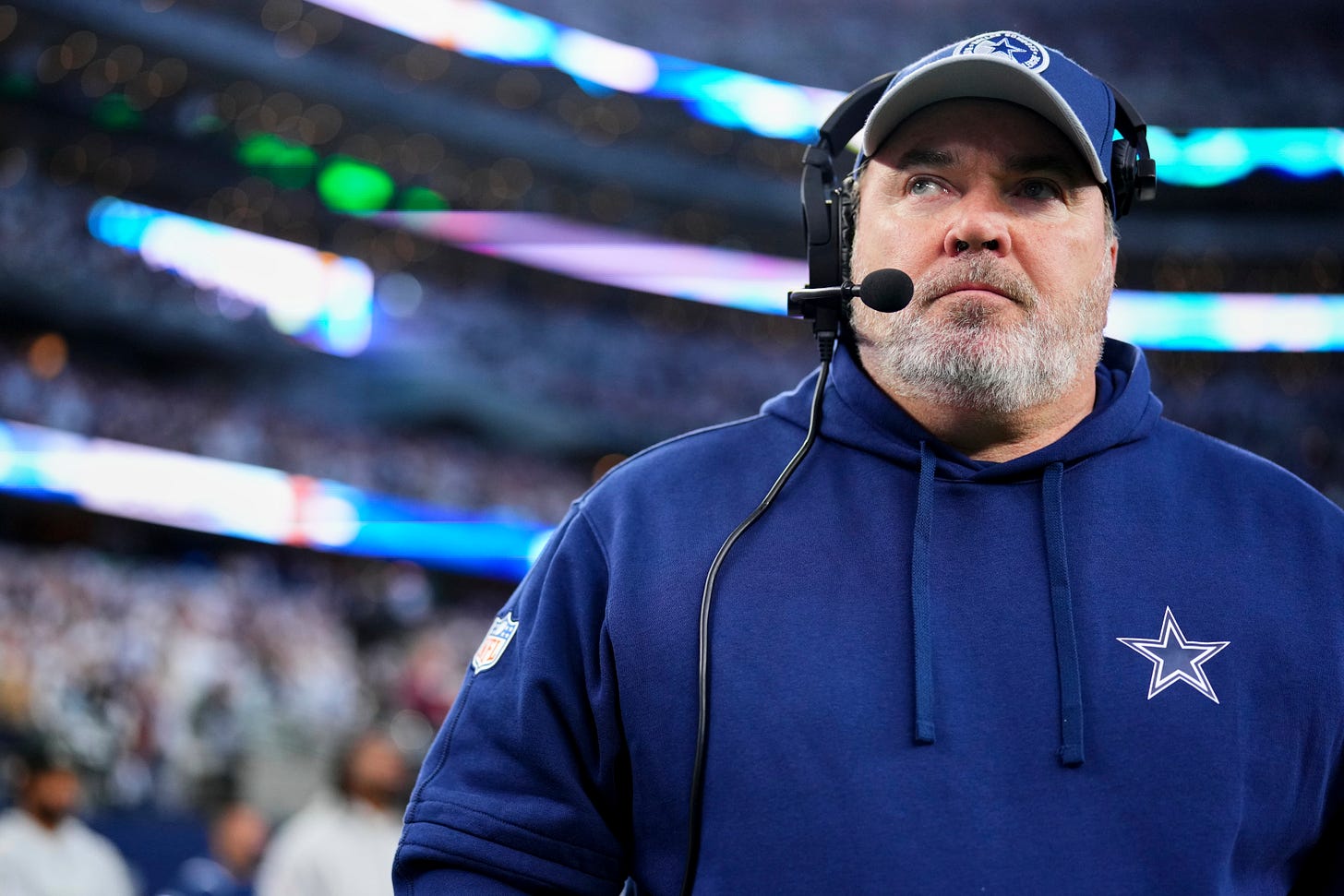
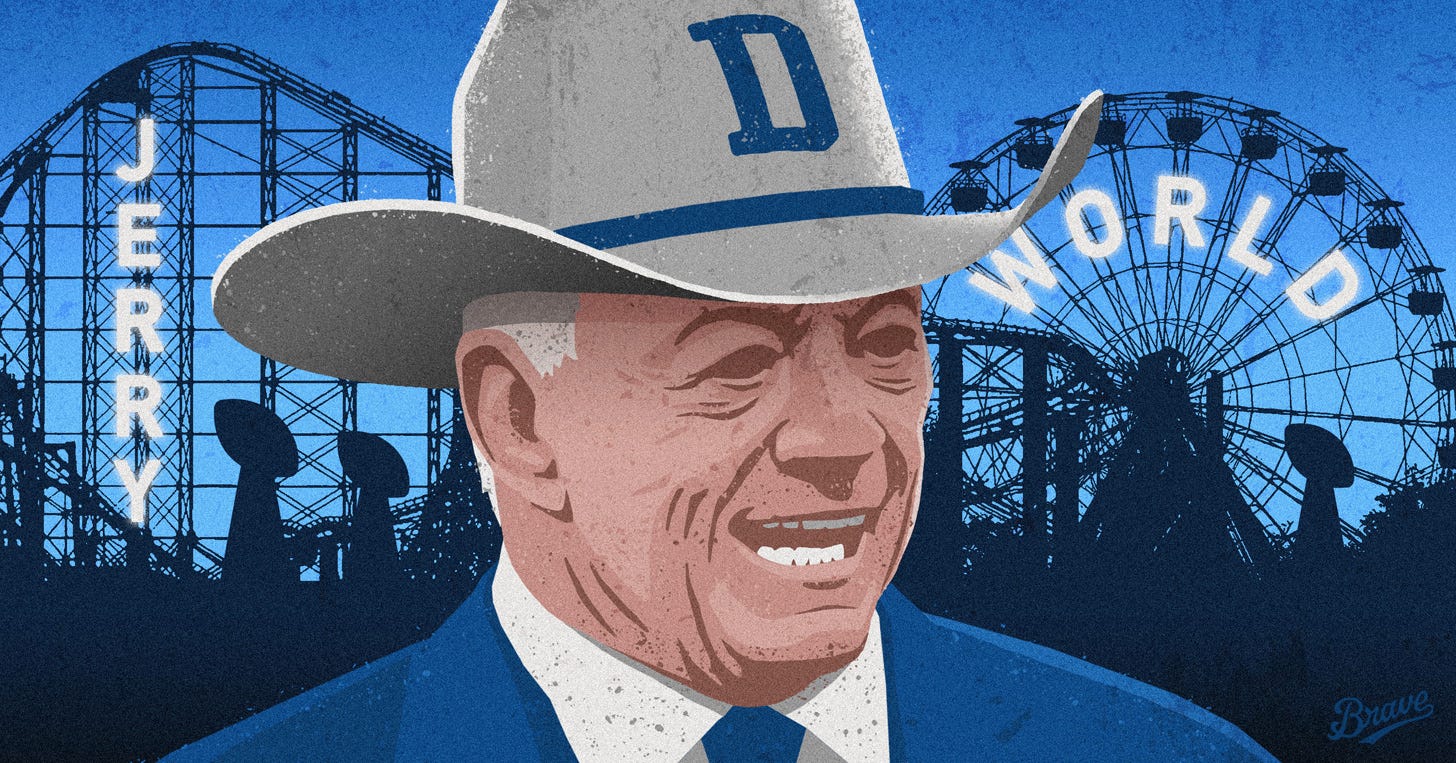





As a 49ers fan, I extra appreciate this piece.
Another good story all the way through, young man. Held my interest by the throat from start to finish. Will circle back and read the three-parter on the Cowboys GoLongTD published a few years ago.